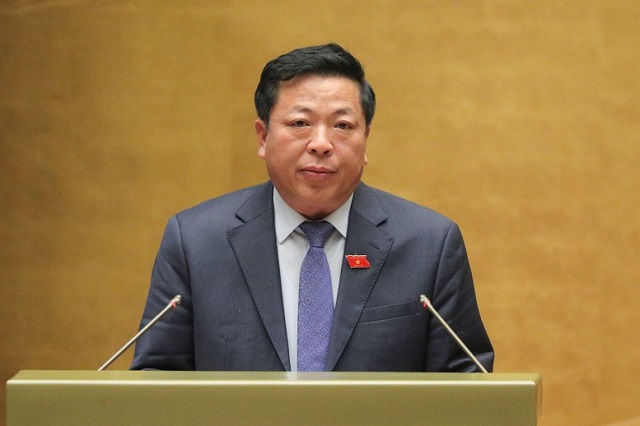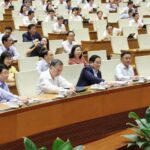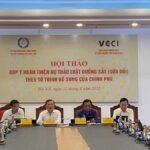 |
Minister of Construction Tran Hong Minh reports to the National Assembly
|
The supplementary report on the amended Railway Law presented by Minister of Construction Tran Hong Minh informed that the draft law has been edited to include 23 mechanisms and policies in the draft resolution of the National Assembly on piloting a number of special mechanisms and policies for investing in the development of the railway system. This is in addition to what was already included in the four chapters of the draft law presented to the National Assembly.
To ensure the progress of investment and construction of railway projects, the government requests that the new additions to the draft law come into effect on July 1, 2025, with the remaining provisions taking effect on January 1, 2026.
The draft law has been supplemented with special mechanisms and policies to invest in the development of the railway system, creating a breakthrough legal framework for railway development. Specifically, the content of the above-mentioned draft resolution has been incorporated into 20 articles of the draft law, and 33 articles have been edited per the reviewing agency’s opinion on the draft law presented to the National Assembly.
On June 15, the government reported on its reception and explanation of the opinions of the National Assembly’s Standing Committee and the reviewing agency’s opinions on the draft Railway Law. They have received and explained the opinions in full and have edited and completed the draft law. After the edit, the draft law consists of four chapters and 60 articles.
Specifically, the scope of the special policies has been reviewed and limited to only apply to important national railway projects and railway projects decided by the National Assembly. It is proposed to supplement the provisions on independent monitoring in the implementation of the special mechanisms and the role of state management to ensure tight control over quality, technical standards, and national defense and security in railway projects as prescribed by investment laws.
At the same time, three policies on waste dumps, construction materials, and forest land use conversion were reviewed and removed from the draft law. Instead, they will be included in the general resolution of this session and applied to the Hanoi-Dong Dang, Haiphong-Halong-Mong Cai railway projects. Two policies on capital arrangement and mobilization were also removed as these policies are associated with the requirements and conditions of specific projects and periods and will be considered when deciding on investment policies.
Additionally, 19 articles were removed from the previously presented draft law as they contained detailed provisions under the authority of the Government and the Minister.
Furthermore, the draft law has been technically edited regarding the provisions on validity and transitional provisions per the opinions of the National Assembly’s Standing Committee.
Presenting the verification report on the law project, Chairman of the Committee for Science, Technology, and Environment Le Quang Huy clarified that the committee agreed to implement the direction of the competent authority to urgently perfect the breakthrough legal framework for investing in the development of the railway system. Therefore, they basically agreed to verify and supplement the amended Railway Law project and report to the National Assembly for consideration and opinions.
At the same time, they agreed to pass the law project at this 9th session of the National Assembly in one session and requested the authoring agency to supplement the dossier, verify, and clarify the verification opinions.
According to the Government’s report, the draft law has been supplemented and edited to legalize 23 special mechanisms and policies, including 21 mechanisms and policies legalized from the National Assembly’s resolutions and two new mechanisms and policies. These include Article 24 on investing in railway projects with non-state capital and Article 36 on contracts.
To institutionalize the Party’s guidelines and legalize the special mechanisms and policies that have been prescribed in the National Assembly’s resolutions on investing in the development of specific railway works, the authoring agency should research and perfect these special mechanisms and policies in the direction of limiting the scope and subjects of application. This should also ensure the consistency, universality, and sustainability of the legal system, strengthen supervision, transparency, and information disclosure, and have appropriate sanctions. At the same time, the feasibility, rigor, and effectiveness of the law must be ensured.
Regarding the mechanism and policy on developing urban areas around railways (TOD model) and exploiting land funds in the vicinity of stations (Articles 26 and 27), many opinions agreed with the mechanism of developing urban areas with public transport as the center (TOD) to exploit the land fund around stations to create resources for railways, in line with the orientation of innovation.
However, it is suggested to clarify and supplement the provisions on clearly defining the limits of local authority in adjusting planning, providing an independent and transparent monitoring mechanism when adjusting planning, supplementing infrastructure capacity criteria, and planning upgrade plans before approving TOD. It is also necessary to specify the conditions for implementation, clearly define the mechanism for distributing revenue, define responsibilities and sanctions, and review, amend, and supplement related laws.
– 11:35 16/06/2025
The Congress Passes Resolution to Amend the Constitution: County-Level Operations to Cease from July 1st, 2025
The National Assembly’s resolution to amend and supplement several articles of the 2013 Constitution stipulates the cessation of district-level administrative units across the country from July 1, 2025, onwards. Additionally, it affirms the status of the Vietnam General Confederation of Labour, the Vietnam Farmers’ Union, the Ho Chi Minh Communist Youth Union, the Vietnam Women’s Union, and the Vietnam Veterans Association as socio-political organizations under the umbrella of the Vietnam Fatherland Front.
Optimizing the Railway Act: A Comprehensive Review and Suggestions for Improvement
The railway industry has long been stagnant, failing to keep pace with the rapid development of other transport sectors. The proposed amendments to the Railway Law are of paramount importance and are expected to offer significant opportunities for Vietnamese businesses to get involved in infrastructure and vehicle development.
Establishing a Two-Tier Local Government Model Across the Nation
The formulation of the Law on Local Government Organization (amended) carries immense historical significance. It lays down a robust legal foundation for the organization and operation of local governments, marking the inaugural establishment of a two-tier local government model in Vietnam.
Revolutionizing Legal Frameworks: Forging Ahead with National Railway Systems
The proposed amendments to the Railway Law signify a pivotal moment for Vietnam’s railway industry. This draft law represents a bold initiative to establish a transformative legal framework, paving the way for the industry’s dynamic evolution and setting a precedent for transportation sector reform in the country.





















